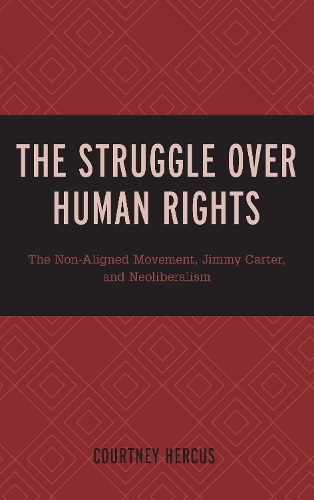
The Struggle over Human Rights: The Non-Aligned Movement, Jimmy Carter, and Neoliberalism
(Hardback)
Publishing Details
The Struggle over Human Rights: The Non-Aligned Movement, Jimmy Carter, and Neoliberalism
By (Author) Courtney Hercus
Bloomsbury Publishing PLC
Lexington Books
17th January 2019
United States
Classifications
Professional and Scholarly
Non Fiction
Politics and government
Central / national / federal government
Central / national / federal government policies
Society and culture: general
341.48
Physical Properties
Hardback
224
Width 159mm, Height 239mm, Spine 23mm
476g
Description
The Struggle over Human Rights: The Non-Aligned Movement, Jimmy Carter, and Neoliberalism traces the origins of the relationship between neoliberalism and the modern doctrine of human rights to the 1970s. It uses empirical evidence to prove that the Carter administration transformed the U.S., and the traditional Western liberal approach to human rights, in response, in part, to the actions of the Non-Aligned Movement. The New International Economic Order (NIEO), a high-point in Non-Aligned solidarity, placed pressures on the power relations of the international system and sought to advance the social and economic rights of the Third World. Carters transformation promoted civil and political rights as the only acceptable human rights and relegated economic rights to a basic needs approach, undercutting welfare state principles in the U.S. and in the newly emergent independent states in Africa, Asia, and the Pacific. This doctrine, as the book highlights through extensive archival research, sharpened the definition of international human rights to serve the maintenance of the U.S.-led world order. Carters diplomatic use of human rights obfuscated exploitative economic structures and paved the way for an aggressive neoliberal transformation through World Bank and IMF Structural Adjustment Programs under Reagan. Historical studies of human rights have ignored these connections, making this book a unique contribution to the scholarship of human rights.
Reviews
The Struggle over Human Rights delivers a granular critical theoretical analysis of the hegemonic struggle over human rights elsewhere recognized as human wrongs from its lineages in the twentieth century and into the post-Cold War era. Its honing in on how the Jimmy Carter administration narrowed the hegemonic definition of human rights in alignment with transnational capital makes this book an essential read. -- Adam David Morton, University of Sydney
Individual human rights, as propounded by the Carter administration, were deployed paradoxically to defeat of the non-aligned movement for a more equitable world order, this doctrine having developed in step with the transnationalization of capital in the 1970s. The Struggle over Human Rights stands as a model of critical political economy scholarship and is a tribute to the thinking of the late Robert Cox as the doyen of that strand of thought. -- Kees van der Pijl, Professor Emeritus, University of Sussex
In this well-researched book, Courtney Hercus provides a neo-Gramscian interpretation of the de-prioritization of social, economic, and cultural human rights. This interpretation emphasizes the hegemony of a particular interpretation of liberalism and liberal world order, within and beyond the USA in the second half of the twentieth century. By revealing how the Carter administration prioritized freedom from governmental action as the key to human rights, this book simultaneously reinforces the importance to human rights history of the counter-hegemonic, post-colonial projects of the 1960s, to which Carter felt the need to respond, and challenges the assumption that the Reagan presidency initiated the neo-liberalism that many people still see within contemporary human rights discourse. -- David Karp, University of Sussex
Author Bio
Courtney Hercus holds a doctorate in international relations from Macquarie University.
